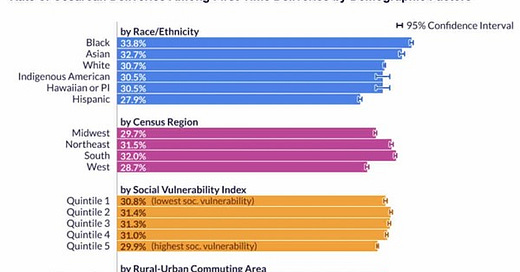Friday Shorts: Annual HIV prevention,C-Section, CT radiation, surgical complications and coffee
March 28, 2025
A. Annual injection may protect against HIV
The first Trump Administration and the Biden Administration, committed to decreasing the number of new cases of HIV infection by 90% by 2030. The key to achieving this goal is providing pre-exposure prophylaxis (PrEP) for those at high risk of HIV. Those on PrEP take daily pills or periodic injections to prevent HIV infection. PrEP taken as directed is associated with a 99% decrease in the risk of sexually-transmitted HIV. There is currently one generic oral daily medication approved for PrEP that costs under $250 annually, but most people on PrEP are on a more expensive brand name drug.
Many people who are at high risk of HIV have difficulty remembering to take daily medicines consistently. Those at highest risk of non-adherence include young people, those with mental illness, transgender people, and those who are unhoused. A PrEP injection that can be given every other month (cabotegravir) is already approved, and an injection given at six month intervals (lenacapavir) is expected to be approved soon. Gilead Pharmaceuticals released data this week showing that a different formulation of lenacapavir led to good blood drug levels for an entire year. This could be especially valuable for those at high risk who cannot adhere to daily medications.
Reports this week suggest that the administration is considering large cuts in the government’s effort to prevent HIV transmission. Such cuts would make it unlikely to reach the targets from 2019 of decreasing HIV infection by 90% by 2030.
B. Low-risk cesarean sections more common in Black first-time mothers
Source: Gracianette, et al Epic Research Network, March 18, 2025
Researchers at the Epic Research Network reviewed results of over two million births at hospitals that used Epic electronic medical records from 2017 until the end of 2024, and found that Black women having their first baby were statistically significantly more likely to have delivery by Cesarean Section (C-S). Women who gave birth in the northeast and south were more likely to have C-S, and women in rural areas were significantly less likely to have delivery by C-S. The researchers limited their analysis to first births in women ages 18-40 and full term (not premature) deliveries.
Even population segments with lower C-S rates in this study have rates that far exceed the World Health Organization recommended rate of 10-15% C-S delivery. Higher rates of C-S mean that more women face recovery from major abdominal surgery even as they are taking care of a newborn and face higher risks of complications in subsequent pregnancies. Cesarean section births on average cost about 50% more than vaginal births. Here’s a link to an article from 2023 about what employers can do to improve maternal quality and safety.
C. Many CT scans expose patients to excess radiation
Ninety-three million CT scans are performed each year in the U.S., and they help diagnose many diseases that previously required operations. But research has shown that radiation exposure varies widely among different CT scanning facilities. Here’s a link to an excellent recent KFF Health News article on this.
Excess radiation exposure can cause premature cancers, and some researchers estimated in 2009 that as many as 2% of all cancers could be caused by CT scans. New regulations from the Centers for Medicare and Medicaid Services will require better record-keeping and transparency around radiation levels, with penalties starting to apply to hospitals or outpatient facilities that don’t comply by 2027.
D. Poor outcomes associated with pre-weekend surgery
Surgeons have long sought to schedule their higher-risk surgery early in the week, leaving patients plenty of time to recover before the weekend. But surgical schedules that are imbalanced lead to shortages of intensive care unit beds early in the week, which can lead to patients “boarding” in the emergency department, sometimes for days. One solution has been to insist that surgeons book their major surgeries throughout the week.
An article in JAMA Network Open shows that among over 400,000 patients having 25 different types of surgery in Ontario, Canada between 2007 and 2019, those who had “pre-weekend” surgery were statistically significantly more likely to have bad outcomes (readmission, complications, or death) at 30 days, 90 days, and one year. Mortality was 9% higher at 30 days in those having surgery late in the week, and hospital stays were 6% longer. The effect was most prominent in vascular and cardiac surgery.
This research is from Canada, but likely relevant to hospitals in the United States. Hospitals need to address staffing and quality of care over weekends to be sure that they are not delivering inferior care.
E. Coffee appears to be good for you
It seems like experts are telling us all the time about dietary items that are unhealthy. I was heartened to read the news that another study has found that coffee is not associated with adverse outcomes across the population but is actually associated with longer life.
Here is a link to Eric Topol’s brief post on this, and here’s a link to the research published in an academic journal on aging which reviews high quality observational studies associating moderate coffee drinking with decreased death rate, and reviews scientific reasons why this makes sense.



